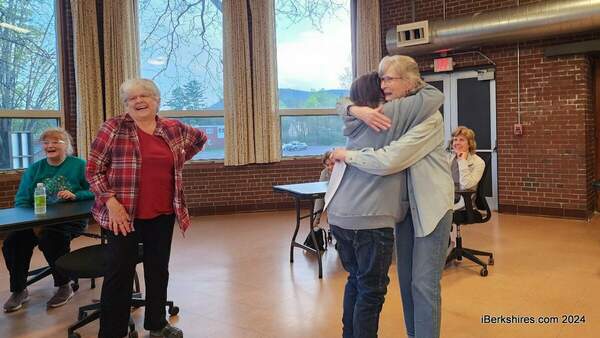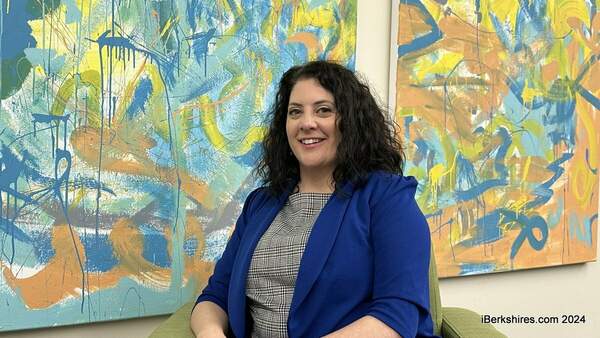Happy Endings for Tenants of Condemned Adams Motel
|
Lauren Bolio, Linda Greenbush and Scott Koczela led the charge to find alternative housing for 27 people living at the Dug-Out Motel before the town condemned it. |
ADAMS, Mass. — After her first visit to the Dug-Out Motel, Lauren Bolio could hardly get herself to leave the driveway knowing that people had to live there for a least a few more months.
Bolio is a program coordinator with Berkshire County Regional Housing Authority and in seven years, she has never been called into a situation so dire and complicated as when the town placed a vacate order on the motel, thus leaving 27 people homeless.
The floors sagged under her feet, mattresses used by a family of eight littered the floor of one room, doors were broken, there were no cooking areas and just deplorable conditions overall.
Each and every resident living in the motel was on disability and many had issues with past rental history, had criminal records, were low income and were desperate.
Now, four months later, she can chuckle a little at some of the sights because she knows that every one of those residents is in better living conditions.
Bolio teamed up with Council on Aging Outreach Coordinator Linda Greenbush and Code Enforcement Officer Scott Koczela to take on the massive project of finding the 12 families homes — going so far as physically moving boxes and furniture in their personal vehicles.
"We had 12 families all facing imminent homelessness and knowing the problems we have in just finding a place for one family, there is no way I could have issued a condemnation order on the spot and put 12 families out on the street," Koczela said on Thursday.
"So, we had [the tenancy preservation project] and anyone else involved to establish receivership so we could at least maintain a stable place for everyone to stay until alternative housing was found.
"For a lot of these people, this was their last stop before going out into the street because of either past rental histories or disabilities or criminal records. We knew it would be a very difficult situation."
All of the tenants were on some kind of disability income but nearly all of that went to rent. Bolio said she met one man who gave just about his entire Social Security check to the managers each month. Rent was between $700 and $900 per month but the residents felt they had nowhere else to go — some had been living there for years.
"It wasn't a nice place to live and it was a real hardship for them to deal with," Bolio said.
When the town issued a vacate order because of numerous health and building code violations, the tenants were scared, confused and rumors ran rampant. That set off a mission to find housing.
"This became an immediate emergency the minute we got involved. Right away the management started to lean on these residents hard. I was getting multiple, frantic calls every morning because the residents went from having to pay monthly to being pressured to paying weekly," Koczela said.
The effort began with a site visit to assess the situation and gather personal information. They met with all of the residents and then nearly all of the Northern Berkshire county service organizations met to brainstorm resources. But they couldn't come up with much.
"It was a really great showing but the fruits were few," Bolio said of the results of that meeting.
|
A teacher reported one of the children living at the motel had been bitten by a rat, prompting the Board of Health to investigate in November. |
Bolio took on the housing effort by helping the residents weave through the paperwork of applying for apartments — from background checks to tracking down birth certificates for subsidized housing units. She said each resident applied for every single public housing opportunity they qualified for and because of the eviction, they were placed high on the priority list.
She sent the applications across the county looking for fits and began looking in the private market. Housing stock is limited — especially for those who need handicapped-accessible units.
"Some of the individuals just didn't have the capacity to locate and secure their own housing. It was definitely going to take hand holding and nurturing process," Bolio said. "They really needed the whole case management piece to move them from a situation from where, I think they felt kind of trapped, at the end of the line. They needed someone to come in and say 'no.' There is better and we're going.'"
Meanwhile, Greenbush took over the other assistance programs, working with the residents nearly every day to find financial assistance, fuel assistance, food stamps or any of the programs available. She later took a role in administering Berkshire Taconic Foundation's Neighbor to Neighbor Fund, in which she would talk a resident through the application and secure "one-time" funding to pay for the security deposit on the new apartment.
The motel owners, Shoba Inc., and the management, Guravtar Enterprises, were battling out responsibility in court while the town was in the process of taking over the property and forcing everyone out. Greenbush and Bolio spent every day with at least some involvement with the residents, comforting them and explaining the process, getting all of their affairs in line for a move and encouraging them.
"My heart went out to these families. This was just before Christmas when this was happening," Greenbush said. "It was just such a sad situation."
When receivership took over, attorney Douglas Rose, who temporarily took over the building while the residents looked for new housing — told all the residents not to pay anymore rent and instead they all put that money toward their new place.
Little by little, each family was accepted into a new housing — either subsidized or market-rate — and Greenbush, Bolio and Koczela would offer their help in moving their possessions to the new place. On the Martin Luther King Day of Service, students from the Massachusetts College of Liberal Arts came to help move a disabled family. Donations from all over — from gift cards to Christmas decorations — poured in for the residents.
By March, all of the residents were out and on Wednesday the court ended receivership and put the motel back in the owner's hands.
"They're living now in safe housing, clean, affordable. They have money now to buy groceries," Greenbush said. "We moved quickly and we worked as a team. It took a village but we had to get them into safe housing."
However, the $11,000 or so bill for the receivership — which includes $600 in emergency heating oil the Board of Health bought when it took over the property — will likely be paid by the bank. The managers and owners are still fighting out responsibility because there was a purchase-and-sale agreement in place to sell the business to the managers in installments. But that agreement never came to completion so they both have claims to the land.
"It was just an amazing feat to move all of those people in such a short period of time," Koczela said, crediting all of the effort to Greenbush and Bolio.
But it isn't over for the three as they continually check in with the residents who moved to make sure they are getting the services they need.
"We'll probably stay with them for the next couple of months to make sure that the services continue and stabilize the tenant," Bolio said.
Tags: board of health, code enforcement, housing, motels, hotels,

















